浅谈英语中的性别歧视
- 格式:doc
- 大小:72.50 KB
- 文档页数:15
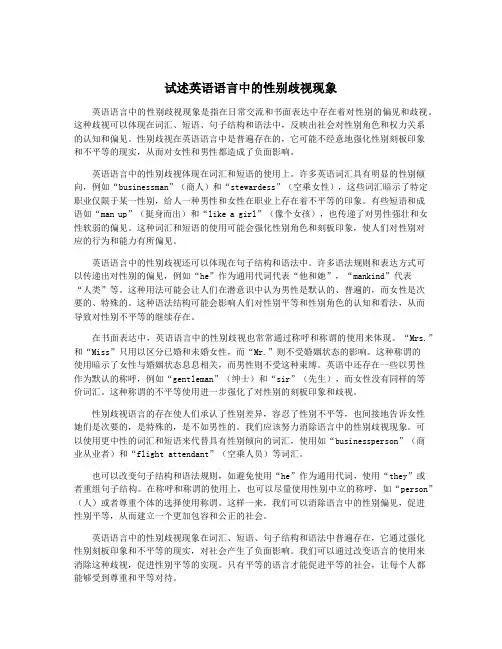
试述英语语言中的性别歧视现象英语语言中的性别歧视现象是指在日常交流和书面表达中存在着对性别的偏见和歧视。
这种歧视可以体现在词汇、短语、句子结构和语法中,反映出社会对性别角色和权力关系的认知和偏见。
性别歧视在英语语言中是普遍存在的,它可能不经意地强化性别刻板印象和不平等的现实,从而对女性和男性都造成了负面影响。
英语语言中的性别歧视体现在词汇和短语的使用上。
许多英语词汇具有明显的性别倾向,例如“businessman”(商人)和“stewardess”(空乘女性),这些词汇暗示了特定职业仅限于某一性别,给人一种男性和女性在职业上存在着不平等的印象。
有些短语和成语如“man up”(挺身而出)和“like a girl”(像个女孩),也传递了对男性强壮和女性软弱的偏见。
这种词汇和短语的使用可能会强化性别角色和刻板印象,使人们对性别对应的行为和能力有所偏见。
英语语言中的性别歧视还可以体现在句子结构和语法中。
许多语法规则和表达方式可以传递出对性别的偏见,例如“he”作为通用代词代表“他和她”,“mankind”代表“人类”等。
这种用法可能会让人们在潜意识中认为男性是默认的、普遍的,而女性是次要的、特殊的。
这种语法结构可能会影响人们对性别平等和性别角色的认知和看法,从而导致对性别不平等的继续存在。
在书面表达中,英语语言中的性别歧视也常常通过称呼和称谓的使用来体现。
“Mrs.”和“Miss”只用以区分已婚和未婚女性,而“Mr.”则不受婚姻状态的影响。
这种称谓的使用暗示了女性与婚姻状态息息相关,而男性则不受这种束缚。
英语中还存在一些以男性作为默认的称呼,例如“gentleman”(绅士)和“sir”(先生),而女性没有同样的等价词汇。
这种称谓的不平等使用进一步强化了对性别的刻板印象和歧视。
性别歧视语言的存在使人们承认了性别差异,容忍了性别不平等,也间接地告诉女性她们是次要的,是特殊的,是不如男性的。
我们应该努力消除语言中的性别歧视现象。
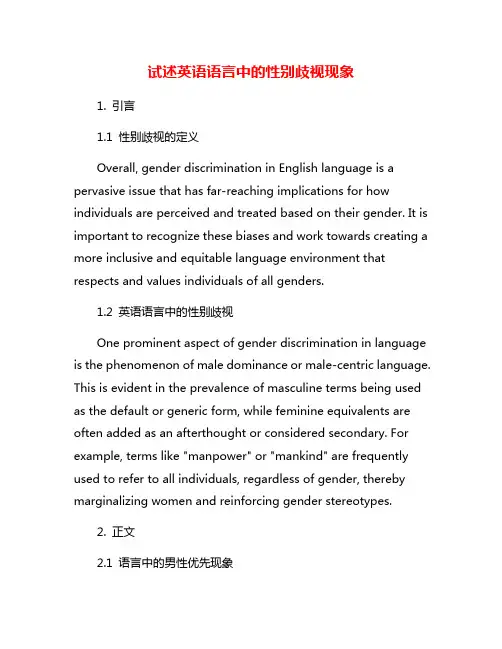
试述英语语言中的性别歧视现象1. 引言1.1 性别歧视的定义Overall, gender discrimination in English language is a pervasive issue that has far-reaching implications for how individuals are perceived and treated based on their gender. It is important to recognize these biases and work towards creating a more inclusive and equitable language environment that respects and values individuals of all genders.1.2 英语语言中的性别歧视One prominent aspect of gender discrimination in language is the phenomenon of male dominance or male-centric language. This is evident in the prevalence of masculine terms being used as the default or generic form, while feminine equivalents are often added as an afterthought or considered secondary. For example, terms like "manpower" or "mankind" are frequently used to refer to all individuals, regardless of gender, thereby marginalizing women and reinforcing gender stereotypes.2. 正文2.1 语言中的男性优先现象Language reflects and influences societal beliefs and norms, including those related to gender. In the English language, there is a pervasive male-centric bias known as the "male as norm" phenomenon. This phenomenon positions men as the default or standard, while women are seen as the deviation from this norm.2.2 语言中的女性贬低现象语言中的女性贬低现象是指在英语语言中存在一些词语或短语,它们贬低女性或将女性视为弱势群体。
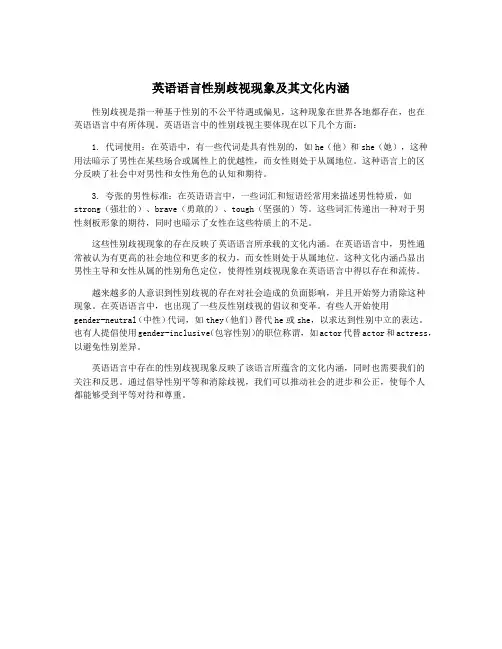
英语语言性别歧视现象及其文化内涵性别歧视是指一种基于性别的不公平待遇或偏见,这种现象在世界各地都存在,也在英语语言中有所体现。
英语语言中的性别歧视主要体现在以下几个方面:1. 代词使用:在英语中,有一些代词是具有性别的,如he(他)和she(她),这种用法暗示了男性在某些场合或属性上的优越性,而女性则处于从属地位。
这种语言上的区分反映了社会中对男性和女性角色的认知和期待。
3. 夸张的男性标准:在英语语言中,一些词汇和短语经常用来描述男性特质,如strong(强壮的)、brave(勇敢的)、tough(坚强的)等。
这些词汇传递出一种对于男性刻板形象的期待,同时也暗示了女性在这些特质上的不足。
这些性别歧视现象的存在反映了英语语言所承载的文化内涵。
在英语语言中,男性通常被认为有更高的社会地位和更多的权力,而女性则处于从属地位。
这种文化内涵凸显出男性主导和女性从属的性别角色定位,使得性别歧视现象在英语语言中得以存在和流传。
越来越多的人意识到性别歧视的存在对社会造成的负面影响,并且开始努力消除这种现象。
在英语语言中,也出现了一些反性别歧视的倡议和变革。
有些人开始使用gender-neutral(中性)代词,如they(他们)替代he或she,以求达到性别中立的表达。
也有人提倡使用gender-inclusive(包容性别)的职位称谓,如actor代替actor和actress,以避免性别差异。
英语语言中存在的性别歧视现象反映了该语言所蕴含的文化内涵,同时也需要我们的关注和反思。
通过倡导性别平等和消除歧视,我们可以推动社会的进步和公正,使每个人都能够受到平等对待和尊重。
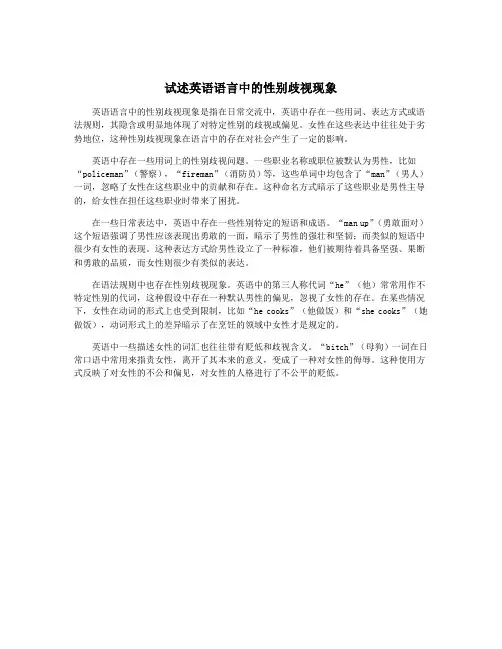
试述英语语言中的性别歧视现象
英语语言中的性别歧视现象是指在日常交流中,英语中存在一些用词、表达方式或语法规则,其隐含或明显地体现了对特定性别的歧视或偏见。
女性在这些表达中往往处于劣势地位,这种性别歧视现象在语言中的存在对社会产生了一定的影响。
英语中存在一些用词上的性别歧视问题。
一些职业名称或职位被默认为男性,比如“policeman”(警察),“fireman”(消防员)等,这些单词中均包含了“man”(男人)一词,忽略了女性在这些职业中的贡献和存在。
这种命名方式暗示了这些职业是男性主导的,给女性在担任这些职业时带来了困扰。
在一些日常表达中,英语中存在一些性别特定的短语和成语。
“man up”(勇敢面对)这个短语强调了男性应该表现出勇敢的一面,暗示了男性的强壮和坚韧;而类似的短语中很少有女性的表现。
这种表达方式给男性设立了一种标准,他们被期待着具备坚强、果断和勇敢的品质,而女性则很少有类似的表达。
在语法规则中也存在性别歧视现象。
英语中的第三人称代词“he”(他)常常用作不特定性别的代词,这种假设中存在一种默认男性的偏见,忽视了女性的存在。
在某些情况下,女性在动词的形式上也受到限制,比如“he cooks”(他做饭)和“she cooks”(她做饭),动词形式上的差异暗示了在烹饪的领域中女性才是规定的。
英语中一些描述女性的词汇也往往带有贬低和歧视含义。
“bitch”(母狗)一词在日常口语中常用来指责女性,离开了其本来的意义,变成了一种对女性的侮辱。
这种使用方式反映了对女性的不公和偏见,对女性的人格进行了不公平的贬低。
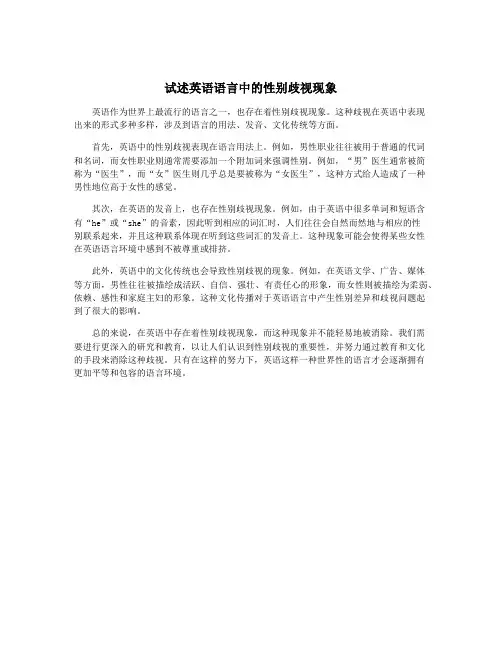
试述英语语言中的性别歧视现象
英语作为世界上最流行的语言之一,也存在着性别歧视现象。
这种歧视在英语中表现
出来的形式多种多样,涉及到语言的用法、发音、文化传统等方面。
首先,英语中的性别歧视表现在语言用法上。
例如,男性职业往往被用于普通的代词
和名词,而女性职业则通常需要添加一个附加词来强调性别。
例如,“男”医生通常被简
称为“医生”,而“女”医生则几乎总是要被称为“女医生”,这种方式给人造成了一种
男性地位高于女性的感觉。
其次,在英语的发音上,也存在性别歧视现象。
例如,由于英语中很多单词和短语含
有“he”或“she”的音素,因此听到相应的词汇时,人们往往会自然而然地与相应的性
别联系起来,并且这种联系体现在听到这些词汇的发音上。
这种现象可能会使得某些女性
在英语语言环境中感到不被尊重或排挤。
此外,英语中的文化传统也会导致性别歧视的现象。
例如,在英语文学、广告、媒体
等方面,男性往往被描绘成活跃、自信、强壮、有责任心的形象,而女性则被描绘为柔弱、依赖、感性和家庭主妇的形象。
这种文化传播对于英语语言中产生性别差异和歧视问题起
到了很大的影响。
总的来说,在英语中存在着性别歧视现象,而这种现象并不能轻易地被消除。
我们需
要进行更深入的研究和教育,以让人们认识到性别歧视的重要性,并努力通过教育和文化
的手段来消除这种歧视。
只有在这样的努力下,英语这样一种世界性的语言才会逐渐拥有
更加平等和包容的语言环境。
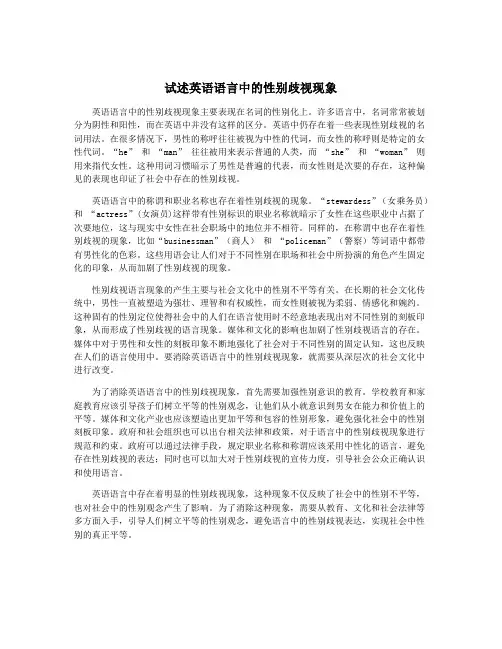
试述英语语言中的性别歧视现象英语语言中的性别歧视现象主要表现在名词的性别化上。
许多语言中,名词常常被划分为阴性和阳性,而在英语中并没有这样的区分。
英语中仍存在着一些表现性别歧视的名词用法。
在很多情况下,男性的称呼往往被视为中性的代词,而女性的称呼则是特定的女性代词。
“he” 和“man” 往往被用来表示普通的人类,而“she” 和“woman” 则用来指代女性。
这种用词习惯暗示了男性是普遍的代表,而女性则是次要的存在,这种偏见的表现也印证了社会中存在的性别歧视。
英语语言中的称谓和职业名称也存在着性别歧视的现象。
“stewardess”(女乘务员)和“actress”(女演员)这样带有性别标识的职业名称就暗示了女性在这些职业中占据了次要地位,这与现实中女性在社会职场中的地位并不相符。
同样的,在称谓中也存在着性别歧视的现象,比如“businessman”(商人)和“policeman”(警察)等词语中都带有男性化的色彩。
这些用语会让人们对于不同性别在职场和社会中所扮演的角色产生固定化的印象,从而加剧了性别歧视的现象。
性别歧视语言现象的产生主要与社会文化中的性别不平等有关。
在长期的社会文化传统中,男性一直被塑造为强壮、理智和有权威性,而女性则被视为柔弱、情感化和婉约。
这种固有的性别定位使得社会中的人们在语言使用时不经意地表现出对不同性别的刻板印象,从而形成了性别歧视的语言现象。
媒体和文化的影响也加剧了性别歧视语言的存在。
媒体中对于男性和女性的刻板印象不断地强化了社会对于不同性别的固定认知,这也反映在人们的语言使用中。
要消除英语语言中的性别歧视现象,就需要从深层次的社会文化中进行改变。
为了消除英语语言中的性别歧视现象,首先需要加强性别意识的教育。
学校教育和家庭教育应该引导孩子们树立平等的性别观念,让他们从小就意识到男女在能力和价值上的平等。
媒体和文化产业也应该塑造出更加平等和包容的性别形象,避免强化社会中的性别刻板印象。
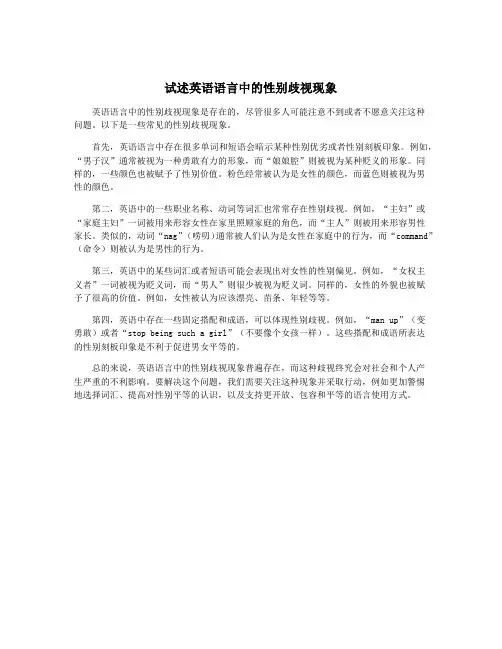
试述英语语言中的性别歧视现象英语语言中的性别歧视现象是存在的,尽管很多人可能注意不到或者不愿意关注这种问题。
以下是一些常见的性别歧视现象。
首先,英语语言中存在很多单词和短语会暗示某种性别优劣或者性别刻板印象。
例如,“男子汉”通常被视为一种勇敢有力的形象,而“娘娘腔”则被视为某种贬义的形象。
同样的,一些颜色也被赋予了性别价值。
粉色经常被认为是女性的颜色,而蓝色则被视为男性的颜色。
第二,英语中的一些职业名称、动词等词汇也常常存在性别歧视。
例如,“主妇”或“家庭主妇”一词被用来形容女性在家里照顾家庭的角色,而“主人”则被用来形容男性家长。
类似的,动词“nag”(唠叨)通常被人们认为是女性在家庭中的行为,而“command”(命令)则被认为是男性的行为。
第三,英语中的某些词汇或者短语可能会表现出对女性的性别偏见。
例如,“女权主义者”一词被视为贬义词,而“男人”则很少被视为贬义词。
同样的,女性的外貌也被赋予了很高的价值。
例如,女性被认为应该漂亮、苗条、年轻等等。
第四,英语中存在一些固定搭配和成语,可以体现性别歧视。
例如,“man up”(变勇敢)或者“stop being such a girl”(不要像个女孩一样)。
这些搭配和成语所表达的性别刻板印象是不利于促进男女平等的。
总的来说,英语语言中的性别歧视现象普遍存在,而这种歧视终究会对社会和个人产生严重的不利影响。
要解决这个问题,我们需要关注这种现象并采取行动,例如更加警惕地选择词汇、提高对性别平等的认识,以及支持更开放、包容和平等的语言使用方式。
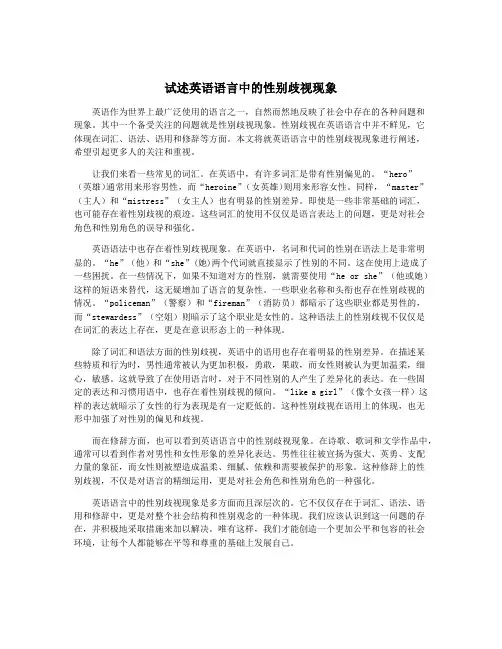
试述英语语言中的性别歧视现象英语作为世界上最广泛使用的语言之一,自然而然地反映了社会中存在的各种问题和现象。
其中一个备受关注的问题就是性别歧视现象。
性别歧视在英语语言中并不鲜见,它体现在词汇、语法、语用和修辞等方面。
本文将就英语语言中的性别歧视现象进行阐述,希望引起更多人的关注和重视。
让我们来看一些常见的词汇。
在英语中,有许多词汇是带有性别偏见的。
“hero”(英雄)通常用来形容男性,而“heroine”(女英雄)则用来形容女性。
同样,“master”(主人)和“mistress”(女主人)也有明显的性别差异。
即使是一些非常基础的词汇,也可能存在着性别歧视的痕迹。
这些词汇的使用不仅仅是语言表达上的问题,更是对社会角色和性别角色的误导和强化。
英语语法中也存在着性别歧视现象。
在英语中,名词和代词的性别在语法上是非常明显的。
“he”(他)和“she”(她)两个代词就直接显示了性别的不同。
这在使用上造成了一些困扰。
在一些情况下,如果不知道对方的性别,就需要使用“he or she”(他或她)这样的短语来替代,这无疑增加了语言的复杂性。
一些职业名称和头衔也存在性别歧视的情况。
“policeman”(警察)和“fireman”(消防员)都暗示了这些职业都是男性的,而“stewardess”(空姐)则暗示了这个职业是女性的。
这种语法上的性别歧视不仅仅是在词汇的表达上存在,更是在意识形态上的一种体现。
除了词汇和语法方面的性别歧视,英语中的语用也存在着明显的性别差异。
在描述某些特质和行为时,男性通常被认为更加积极,勇敢,果敢,而女性则被认为更加温柔,细心,敏感。
这就导致了在使用语言时,对于不同性别的人产生了差异化的表达。
在一些固定的表达和习惯用语中,也存在着性别歧视的倾向。
“like a girl”(像个女孩一样)这样的表达就暗示了女性的行为表现是有一定贬低的。
这种性别歧视在语用上的体现,也无形中加强了对性别的偏见和歧视。
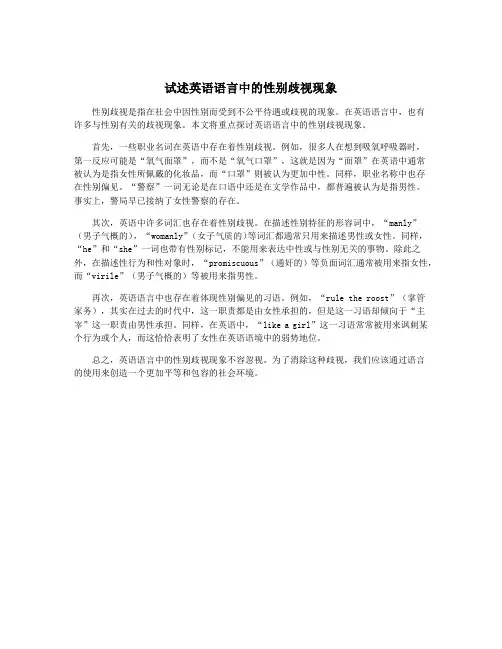
试述英语语言中的性别歧视现象性别歧视是指在社会中因性别而受到不公平待遇或歧视的现象。
在英语语言中,也有许多与性别有关的歧视现象。
本文将重点探讨英语语言中的性别歧视现象。
首先,一些职业名词在英语中存在着性别歧视。
例如,很多人在想到吸氧呼吸器时,第一反应可能是“氧气面罩”,而不是“氧气口罩”,这就是因为“面罩”在英语中通常被认为是指女性所佩戴的化妆品,而“口罩”则被认为更加中性。
同样,职业名称中也存在性别偏见。
“警察”一词无论是在口语中还是在文学作品中,都普遍被认为是指男性。
事实上,警局早已接纳了女性警察的存在。
其次,英语中许多词汇也存在着性别歧视。
在描述性别特征的形容词中,“manly”(男子气概的),“womanly”(女子气质的)等词汇都通常只用来描述男性或女性。
同样,“he”和“she”一词也带有性别标记,不能用来表达中性或与性别无关的事物。
除此之外,在描述性行为和性对象时,“promiscuous”(通奸的)等负面词汇通常被用来指女性,而“virile”(男子气概的)等被用来指男性。
再次,英语语言中也存在着体现性别偏见的习语。
例如,“rule the roost”(掌管家务),其实在过去的时代中,这一职责都是由女性承担的,但是这一习语却倾向于“主宰”这一职责由男性承担。
同样,在英语中,“like a girl”这一习语常常被用来讽刺某个行为或个人,而这恰恰表明了女性在英语语境中的弱势地位。
总之,英语语言中的性别歧视现象不容忽视。
为了消除这种歧视,我们应该通过语言的使用来创造一个更加平等和包容的社会环境。
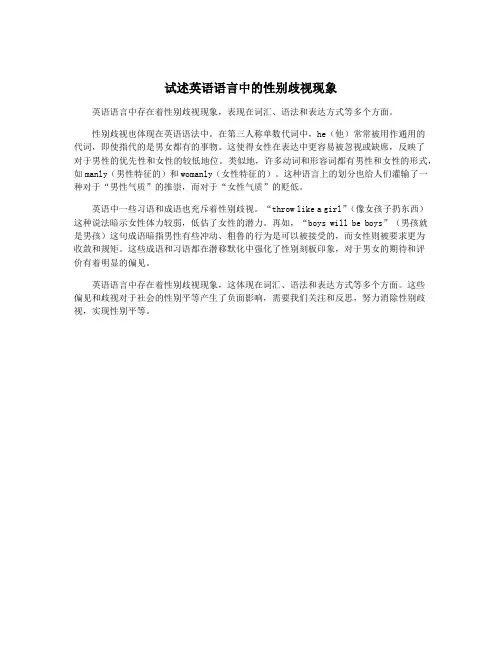
试述英语语言中的性别歧视现象
英语语言中存在着性别歧视现象,表现在词汇、语法和表达方式等多个方面。
性别歧视也体现在英语语法中。
在第三人称单数代词中,he(他)常常被用作通用的
代词,即使指代的是男女都有的事物。
这使得女性在表达中更容易被忽视或缺席,反映了
对于男性的优先性和女性的较低地位。
类似地,许多动词和形容词都有男性和女性的形式,如manly(男性特征的)和womanly(女性特征的)。
这种语言上的划分也给人们灌输了一种对于“男性气质”的推崇,而对于“女性气质”的贬低。
英语中一些习语和成语也充斥着性别歧视。
“throw like a girl”(像女孩子扔东西)这种说法暗示女性体力较弱,低估了女性的潜力。
再如,“boys will be boys”(男孩就是男孩)这句成语暗指男性有些冲动、粗鲁的行为是可以被接受的,而女性则被要求更为
收敛和规矩。
这些成语和习语都在潜移默化中强化了性别刻板印象,对于男女的期待和评
价有着明显的偏见。
英语语言中存在着性别歧视现象,这体现在词汇、语法和表达方式等多个方面。
这些
偏见和歧视对于社会的性别平等产生了负面影响,需要我们关注和反思,努力消除性别歧视,实现性别平等。
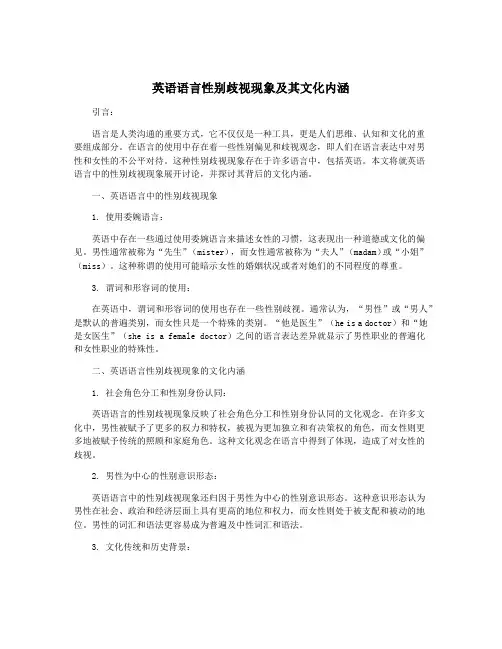
英语语言性别歧视现象及其文化内涵引言:语言是人类沟通的重要方式,它不仅仅是一种工具,更是人们思维、认知和文化的重要组成部分。
在语言的使用中存在着一些性别偏见和歧视观念,即人们在语言表达中对男性和女性的不公平对待。
这种性别歧视现象存在于许多语言中,包括英语。
本文将就英语语言中的性别歧视现象展开讨论,并探讨其背后的文化内涵。
一、英语语言中的性别歧视现象1. 使用委婉语言:英语中存在一些通过使用委婉语言来描述女性的习惯,这表现出一种道德或文化的偏见。
男性通常被称为“先生”(mister),而女性通常被称为“夫人”(madam)或“小姐”(miss)。
这种称谓的使用可能暗示女性的婚姻状况或者对她们的不同程度的尊重。
3. 谓词和形容词的使用:在英语中,谓词和形容词的使用也存在一些性别歧视。
通常认为,“男性”或“男人”是默认的普遍类别,而女性只是一个特殊的类别。
“他是医生”(he is a doctor)和“她是女医生”(she is a female doctor)之间的语言表达差异就显示了男性职业的普遍化和女性职业的特殊性。
二、英语语言性别歧视现象的文化内涵1. 社会角色分工和性别身份认同:英语语言的性别歧视现象反映了社会角色分工和性别身份认同的文化观念。
在许多文化中,男性被赋予了更多的权力和特权,被视为更加独立和有决策权的角色,而女性则更多地被赋予传统的照顾和家庭角色。
这种文化观念在语言中得到了体现,造成了对女性的歧视。
2. 男性为中心的性别意识形态:英语语言中的性别歧视现象还归因于男性为中心的性别意识形态。
这种意识形态认为男性在社会、政治和经济层面上具有更高的地位和权力,而女性则处于被支配和被动的地位。
男性的词汇和语法更容易成为普遍及中性词汇和语法。
3. 文化传统和历史背景:英语语言的性别歧视也与文化传统和历史背景有关。
在过去的几个世纪中,男性在社会生活中扮演着重要角色,而女性则被限制在家庭和私人生活中。
英语语言性别歧视现象及其文化内涵性别歧视是指因性别而对个人进行不公平的区分或不公平的对待。
而言语则是人类交流的重要工具,但在语言中也存在着对性别的歧视。
英语作为世界上使用最广泛的语言之一,自然也存在着性别歧视的现象。
这种现象不仅仅是语法和语言结构上的问题,更涉及到文化内涵和社会意识形态。
本文将探讨英语语言中的性别歧视现象及其文化内涵。
英语语言中的性别歧视现象主要体现在两个方面:名词性别和代词使用。
首先是名词性别,英语中的很多名词是有性别区分的,例如“steward”和“stewardess”、“policeman”和“policewoman”等。
这种名词的性别区分实际上反映了社会的性别角色划分,强调了男女在特定职业或特定角色中的不同地位。
其次是代词使用,英语中的代词“he”和“she”也是性别化的,而且在很多情况下,“he”常常被用作中性代词,而“she”则被特指为女性。
这种代词的使用也暗含了社会对性别的刻板印象和定位,对女性的忽视和边缘化。
英语语言中的性别歧视现象还体现在一些固定搭配和习语中。
“man of the house”就是一个典型的固定搭配,这种搭配强调了男性在家庭中的权威地位,而对女性的忽视和边缘化。
在英语中还存在着很多以男性为代表的习语,例如“the man in the street”、“a man's job”等,这些习语实际上也是对女性的不公平对待和歧视。
除了语言结构和固定搭配,英语中的性别歧视还体现在文化内涵和社会意识形态上。
英语国家的文化中,男性往往被视为坚强、有能力,而女性则被视为柔弱、需要保护,这种观念在语言中得到了体现。
相比之下,许多其他语言中并没有这种性别划分,或者性别划分并没有那么明显。
这种文化内涵和社会意识形态的影响不仅限于英语国家,而是对整个世界的性别认知和性别角色划分产生了影响。
解决英语语言中的性别歧视问题,首先需要从语言结构上加以改变。
可以采取使用中性化的名词来替代性别化的名词,例如用“flight attendant”来替代“stewardess”,用“police officer”来替代“policeman/policewoman”。
试述英语语言中的性别歧视现象1. 引言1.1 性别歧视的定义性别歧视是指基于性别或性别认同而产生的不公平对待或偏见。
这种不平等对待通常是由社会、文化或制度性因素造成的,导致对特定性别的人或群体进行歧视、排斥或限制他们的权利和机会。
性别歧视不仅限制了个人的发展和自由,也损害了整个社会的平等和公正。
在英语语言中,性别歧视也是普遍存在的现象。
这种现象体现在英语词汇、语法结构和语言习惯中。
一些特定的职业名称在英语中被默认为男性或女性,导致了对不同性别从事特定职业的偏见。
一些动词和形容词也存在着明显的性别偏见,如将男性与积极、有力或有能力联系在一起,而将女性与消极、软弱或无能联系在一起。
性别歧视在英语语言中的存在不仅影响了个体的自我认同和社会地位,也对整个社会的性别平等和公正构成了挑战。
我们需要更加关注和认识英语语言中的性别歧视问题,并采取积极的措施来消除这种现象,促进性别平等和社会公正。
1.2 英语语言中的性别歧视Gender discrimination in the English language is a pervasive issue that reflects and perpetuates societal gender biases. From the way we address individuals to the words we use to describegender roles, language plays a powerful role in reinforcing stereotypes and inequalities between men and women.2. 正文2.1 语言中的性别偏见语言中的性别偏见是指对不同性别的人在语言使用中存在偏向或偏见。
这种偏见可能体现在词汇选择、句法结构、语气和声调等方面。
在英语语言中,常见的性别偏见表现包括对男性视为默认或普遍代表,而女性则被视为特例或次要代表。
试述英语语言中的性别歧视现象英语是全球通用的语言之一,然而在英语语言中,性别歧视现象依然存在。
性别歧视是指基于性别对个体或群体进行不公平对待或给予特别优待的现象。
性别歧视在语言中表现为对男性和女性采用不同的称呼、用词和语法结构等方面,反映了社会对性别角色的刻板印象和偏见。
本文将试述英语语言中的性别歧视现象,并探讨如何消除这些不平等对待。
在英语语言中,性别歧视表现为对男女性别采取不同的称呼。
通常情况下,男性的称呼更多样化,如“sir”, “mister”, “gentleman”, 而女性的称呼只有“miss”或“mrs”,没有相应的称呼像男性一样多元。
这种情况反映了对男性称呼的尊重和尊重,而对女性称呼的简化和单一化,这可能会在潜移默化中影响对男女性别的认知和对待。
性别歧视还在英语语言中体现为用词的不平等对待。
比如“master”一词用于男性称呼,而“mistress”则被用于女性称呼,这体现了对男女性别的不平等对待。
同样,英语中有一些词语在男女性别中有不同的含义,如“bossy”一词常用来形容女性,而“assertive”则用于男性,这种双重标准也反映了对男女性别的不公平对待。
在英语语言的语法结构中也存在性别歧视现象。
在一些情况下,英语语法结构中的代词和形容词会根据性别的不同而有所变化。
比如“he”和“she”、“his”和“hers”,“man” 和“woman”等,这些词汇的不同变形也反映了对男女性别的不平等对待。
性别歧视在英语语言中的存在,不仅仅是对具体的语言表达形式的偏见,更是对于整个社会对于男女角色和期望的一种延续。
这种对于性别的不平等对待,不仅仅在语言中存在,在社会的方方面面都有所体现,而语言作为社会交流的一种方式,更是将这种歧视延续和传递的一种方式。
为了消除英语语言中的性别歧视现象,我们需要从多个方面着手。
教育机构应该在教学中注重性别平等教育,教导学生尊重性别差异,消除性别歧视的观念。
试述英语语言中的性别歧视现象在英语语言中存在着一些性别歧视的现象,这种歧视往往体现在对男女性别的称呼、表达方式、词汇选择等方面。
虽然在现代社会中已经有了很多对性别歧视的反对和改变,但是在语言中的性别歧视现象依然存在,需要引起我们的重视和关注。
英语语言中存在着一些针对女性的歧视称呼。
在很多情况下,人们会用一些带有贬义的词汇来形容女性,比如"bitch"、"slut"、"whore"等词汇。
这些词汇不仅在口头语言中被使用,而且在文学作品、音乐歌曲等媒体中也能听到,这种现象就是对女性的一种侮辱和歧视。
即使不是带有贬义的词汇,一些称呼也可能存在着性别歧视的成分,比如对女性称呼为"女士"或"太太",而对男性称呼为"先生"。
这种称呼方式很容易让人觉得女性地位低于男性,存在着一种隐性的性别歧视。
英语语言中的一些词汇选择也表现出了性别歧视的现象。
比如在一些职业名称中,往往会出现男性化的形式,比如"policeman"、"fireman"等,而女性从业者则要用"policewoman"、"firewoman"这样的词汇来表示。
这种词汇选择会使人们在心理上产生一种认为这些职业适合男性从事的偏见,从而使女性在职业选择上受到了限制。
在一些成语、俗语中也存在着性别歧视的现象,比如"man's world"、"boys will be boys"等俗语在一定程度上暗示了男性的优越性,从而排斥了女性的存在和地位。
试述英语语言中的性别歧视现象性别歧视是指因为一个人的性别而对其进行不公平对待的现象。
在英语语言中,性别歧视的现象也是普遍存在的。
这种现象可能体现在词汇、语法和语用上。
本文将试述英语语言中的性别歧视现象,并探讨如何消除这些现象。
英语语言中的语法结构也存在着性别歧视现象。
使用“he”(他)作为普遍性别代词,而忽略了“she”(她)的存在。
在很多情况下,人们可能也会使用“man”(男人)作为泛指,而不是使用更中性的术语。
这种语法上的性别歧视也会巩固人们对于性别的刻板印象,让人们产生误以为男性是普遍性的代表的偏见。
英语语言中的语用也存在着性别歧视现象。
在交流中,人们可能不经意地使用了一些带有性别偏见的语言。
称赞女性时可能会聚焦在外貌而非能力,或者当女性表现出强硬的态度时可能会被贴上“女汉子”的标签。
这种语用上的性别歧视也会进一步强化人们对性别的偏见和刻板印象。
那么,如何消除英语语言中的性别歧视现象呢?我们可以通过修正词汇来消除性别暗示。
将“policeman”和“fireman”改为“police officer”(警官)和“firefighter”(消防员)来避免性别的暗示。
我们可以通过使用更中性的代词和语法结构来减少性别歧视。
使用“they”(他们/她们)来替代“he”或“she”,同时也可以使用“humankind”(人类)来替代“mankind”(人类)等。
我们也可以通过教育和倡导来改变人们对于性别的刻板印象,引导人们更加理性地看待性别。
英语语言中的性别歧视现象是普遍存在的。
这种现象体现在词汇、语法和语用上,带来了对于性别的印象和偏见。
我们可以通过修正词汇、使用更中性的代词和语法,以及通过教育和倡导来消除这些现象。
让我们共同努力,消除英语语言中的性别歧视,创造一个更加平等和和谐的社会。
【2000字】。
试论英语语言中的性别歧视一、性别歧视产生的原因(一)历史原因历史上的性别歧视由来已久。
在男性言语中,居主导地位的是权利意识,他们在话语运用过程中,意图实施其自认为应有的权利去实现对别人的控制;而女性话语则是平等的,言语的运用意在表明对所谈到的人或事物的兴趣、态度、关注等等,对她们来说,语言是交流思想,保持友谊的手段。
(二)社会分工不同在西方,社会长期存在着男尊女卑的现象。
男性身材高大,精力充沛,似乎他们更适合从事与生产有关的劳动在社会中占主导地位。
女性身材较小,比较文静、温柔,似乎适宜从事与人的再生产有关的劳动,所以女性处于从属地位。
这样,男性在经济上就占了主导地位,垄断了经济、政治、法律等公共领域;女性则处于附属地位,这一社会特征反映在语言上,就表现为英语性别歧视语言的大量存在。
(三)宗教思想在西方国家的文明发展中,基督教是西方文化的基石。
基督教教义以男性为主体,处处充斥着对女性的歧视。
在《圣经》中,上帝创造的第一个人类是男性,为了不让他感到孤单寂寞,上帝从男人身上取下一根肋骨,创造了一个女性去帮助和陪伴他。
所以,女性往往被视为男性的附属品,只能处于从属的地位。
二、英语语言中性别歧视的表现(一)词和构词上的性别歧视在英语的词汇和构词方面存在着语言的性别歧视。
例如man的使用范围相当广,它不仅可以表示男性,而且可以泛指人。
用man来泛指所有的人,明显是把男性放在中心地位,把女性融化在男性世界之中。
而man的对应词woman,专指妇女,不能表示人类,如若用woman来指男性,则带有贬义,例如:Li Ming is an old woman.李明是一个婆婆妈妈的人。
在构词上,也能看到对女性的歧视,例如:女性(female)就是由男性(male)派生而来的。
男性词总是无标记的,相反女性词汇是有标记的,女性词往往以男性名词为词根,加上相对固定的后缀而构成,以阴性后缀“-ess”为例,常见的有:author和authoress。
[Abstract] Language plays an important role in society. As a phenomenon of society, language reflects all the sides of human society naturally. Sexism is a phenomenon that takes a male-as-norm attitude, trivializing, insulting or rendering women invisible. As a special social phenomenon, sexism is inevitably reflected through language.To start with, the thesis traces the reasons for the occurrence of sexism in the English language. In nature, sexism in language reflects sexism in society. The two are closely related. Social connotations of sexism in English tell the relationship between phenomenon of sexism in language and essence of sexism in society. Then the thesis analyses sexism in terms of the generic masculine, word order and semantic derogation of women in greater detail. Finally, a large part of the thesis is contributed to how to change sexism in English. The author of the thesis thinks the key to the problem is: (1) solve the problem of generic pronouns; (2) neutralize lexis; (3) strive for balanced naming and addressing system; (4) coin new corresponding words. The elimination of linguistic sexism lies in social change. Only by changing the social structure, that is, women and men own really equal status, can language equality be truly achieved.[Key Words] sexism; English language; lexical neutralization; feminism[摘要] 语言在社会中所处的地位尤为重要。
作为一种社会现象的语言,必然会反映出人类社会的各种社会观念。
性别歧视作为这其中的一种,是指把男性视作社会规范和中心,轻视,侮辱女性或使她们显得微不足道。
而这一特定的社会现象必然会在语言中折射出来。
论文首先剖析了英语中性别歧视现象形成的根源。
从本质来说,语言中的性别歧视是社会中性别歧视的体现。
两者紧密相连。
性别歧视的社会内涵反映的就是这种语言中的性别歧视现象与社会中的性别歧视的本质的关系。
接着论文从阳性词泛指,词序,词义的贬降等方面对英语中的性别歧视现象进行了详细的分析。
最后论文还着力探讨如何改变这种歧视。
作者认为,改变性别歧视主要解决以下几个问题:(1) 避免阳性代词的泛指;(2) 词汇的中性化;(3)命名与称谓的对等;(4)创造新的对应词。
语言中的性别歧视的最终消亡取决于社会变化。
只有改变社会结构,即男女真正拥有平等的地位,语言中的平等才能真正实现。
消除语言中的性别歧视的根本在于实现男女的平等的社会变革。
[关键词] 性别歧视;英语语言;词汇中性化;女权主义1. IntroductionAs the peculiar result of the development of human society, language is a kind of social phenomenon and reflects all the sides of human society naturally. Its existence and development are closely linked with the social attitudes of human beings and to a great extent are affected by their social views and values. Historically and sociologically, our society is man-oriented and man-centered.Women, regarded as a weaker gender in society, are discriminated for a long time and completely subordinated in political life, economic life and even family life in the society dominated by men. Unavoidably, this kind of phenomenon has been embodied in languages. In linguistic aspect, language is bias-based and women suffer from language sexism. Gender-differentiated language use can reflect and help perpetuate the subordinate status of women in society. Since 1960s, feminists strive for the elimination of gender discrimination, for the greater recognition of women‟s contributions to society and aim to change many cultural and social customs that perpetuate patriarchal value systems. Many fields of life around the world have been, or are being, affected by this movement. One of the many impacts feminism on society is its impact on language. Language was and is seen by many feminists as a powerful instrument of patriarchy.2. The Factors of Sexism in the English LanguageSexism in English is not formed in one day, but built up in the long period of the development of language, which leads to the variety of the causes. What causes the sexism in the English Language? There are four factors: cultural factor, physiological factor, social factor and psychological factor.(1) Cultural factorIn the Holy Bible (The Books of Th e Old Testament): “So the Lord God caused a deep sleep to fall upon the man, and he slept; then he took one of his ribs and closed up its place with flesh. And the rib that the Lord God had taken from the man he made into a woman and brought her to the man. Then the man said, …This at last is bone of my bones and flesh of my flesh; this one shall be called Woman, for out of Man this one was taken.‟ ” [1]Man came to the world first while woman made from one of man‟s ribs was created just as a help meet for him. And she was not created until all other animals failed to meet the satisfaction of the man. From the order of the birth, it is obvious to see the different importance of man and woman. And man and woman are not equal at all because woman is only a part of man, which itself is the discrimination against women. It is said in the Holy Bible that the first sin is also committed by the woman. She was seduced by the snake into eating the fruit of the tree of the knowledge of good and evil and having the man eat, too. At last, the woman was punished to bring forth children in pain and was ruled over by the man. From above, the superiority of men and inferiority of women is clearly seen. The Holy Bible is actually a book of men. As Christianity is such a powerful religion in Western countries, it is unreasonable to deny that this helps to set and consolidate the inferiority of women.(2) Physiological factorFor extended work and life together, people realized that men are tall in stature, strong in muscle and robust in physique. In contrary to men, women are small in stature, weak in physique and have more fat and less muscle than men. Women also mature more rapidly. [2] In a word, men are stronger than women. This determines that men play a more and more important role in social and economic lives. A man‟s job is to work outside but a woman‟s job is to stay at home, do the housework and take care of the children. Women are treated as the weaker ones and they realize their own values through their marriages to men. At last, women are lower in status. They have to leech on to men and are dominated by men. Gradually, people begin to discriminate women and think that they are inferior in intelligence. This wrong perspective forms slowly and reflects in language.(3) Social factor (Labor division)Feminists all claim that we live in a patriarchal society: a society of men, ruled by men and for men. Patriarchy depicts men as the perfect norm against which women are measured and found lacking.Both the Western and Eastern societies use sex, to one degree or another, in allocating tasks, activities, rights, and responsibilities. As for the job done by men and women, there is a long-stereotyped notion of what they can do. In history, there has been a division of labor--a division in which women‟s place was restrained at home for housework and child-care while men worked outside being the breadwinner. At last, men had dominance over women, and women had to be dependent on men. This was the turning point for women. From then on, in paternal society, slavery society and capitalist society, women had been on the bottom of society. In long and endless course of history, sexism against women has been accumulated. It is due to different labor division that leads to different social status. This has been clear in ancient and modern society. Later, in addition to domestic work, women began to enter the paid work place. However, even though half of women are employed outside the home, the belief persists that woman is mainly, and primarily, in the roles of wife and mother. Due to women's relative physical weakness and lower educational background, they do primarily the low-status, low-paying jobs. Although men also have family roles, they are defined primarily by their economic or occupational position. Thus the sexism in the society has been in existence, the embodiment of which is necessarily the sexism of language.(4) Psychological factorBecause of the social and cultural factors, women are always considered to be the weak. People treat women as inferior to men. They educate men to be manly, decisive, and brave while women are required to be polite, conservative, obedient, and gentle. Because women are in subordinate status in the society, they have to constrain their emotion and give up their own need to meet the satisfaction of men. As time passes, when speaking women pay more attentionto the elegance and standard of language than men. They use more pleasant and polite words in the hope that they can receive other‟s approval. And they are taught to speak softly, to avoid contradicting others, to be obedient in communication, and to be aware of giving cues of strong confidence. They mould themselves to be inferior in their potential sub consciousness.[3] Therefore, women try their best to strengthen their social status through their speech than men do. The lower women‟s position is, the more polite they are in the face of others. And the standard language they use can show their submission and politeness. This also suggests that women are in a lower position in the society.3. Phenomena of sexism in the English language3.1 The generic masculineSexism in language in general comes in three major forms: language ignores women; it defines women as less significant than men; and it completely opposes women. They can be located in the generic masculine terms.3.1.1 Generic pronounsGeneric pronouns are pronouns that are said to refer, with equal likelihood, to women and men. But the English language ignores women by allowing masculine terms to be used specifically to refer to males and commonly to refer to human beings in general. The generic pronoun “he” is perhaps the most well known example of the gender-specific of sexist language, and is frequently referred to be “he/man” language. T he most significant manifestation of the sexism is in the use of generic masculine pronouns “he” and its variants “his”, “him” and “himself” in such sentences as:(1) He who laughs last laughs best.(2) Everyone must do his homework well.(3) If anyone calls, tell him I will be back later.(4) Everyone should learn to solve problems himself.In the above examples, “he”, “his”, “him” and “himself” are used notsex-specifically, but generically, that is, although the pronouns refer grammatically to the single male citizen, they should be taken to refer to both male and female citizens in general. On the formal occasions, …he‟, …him‟ or …his‟ can be used to refer to such indefinite pronouns as each, everyone, everybody, no one, someone, anyone and so on. While …she‟, …her‟, …herself‟ don‟t have such usages.3.1.2 Generic nounsAnother well-known example of generic masculine terms is “man”. The definitions of “man” in Oxford Advanced Learner‟s English-Chinese Dictionary(Extended fourth edition) are as follows: ①adult male human being; ②human being of either sex; person ③[sing](without the or a) the human race; mankind. There are some examples taken from the dictionary. ①All men must die. ②Growing old is something a man has to accept. ③Man is mortal. [4] From these definitions and examples, it is easy to see that “man”, and “men” can be used generically to refer to both male and female. But …woman‟ and …women‟ cannot be employed in reference to men.This also reminds people of the famous saying from the US Declaration of Independence: “All men are created equal.” Should people argue that the “men” does not include women because women were not given the right to vote in the eighteenth century America? [5] A clear explanation of this phenomenon may be found in sentence like:(1) Man is a social animal.(2) Men remake nature.When seeing the three sentences, speakers of English are able to readily interpret “man” and “men” as meaning “the human race”; “humankind”. If not, the two sentences could be changed into(3) Woman is a social animal.(4) Women remake nature.Of course, they are grammatically well formed; semantically, however, the third sentence has the defect of being partial, and the fourth sentence is very ridiculous.From above, one can know that in Engl ish using “man” or “men” to indicate “the human race”, neglects the fact that men and women are equal in the society. By contraries, they treat man as the center of society, an embodiment of criterion and totally ignore the existence of woman.[6] There are many other generic masculine terms such as man-to-man, prehistoric man, brotherhood, chairman, and policeman.3.1.3 Women being attached to menThe English language distinguishes women‟s courtesy titles on the basis of marital status, but not those of men. There is only one form of address for men, Mr., regardless of martial status. However, the martial status of women is distinguished by Miss and Mrs., reflecting the notion that whether or not a woman is in a marriage. This discriminatory practice is said to mark the availability of women in terms of marriage (sex) and reinforces the view that a woman is the property of a man (either her father or her husband). When a woman has been married, people address her as “Mrs. plus her husband‟s surname”. That i s to say, if a woman is married to somebody, she has no right to be treated like an unmarried lady. As to a man, that‟s a different matter. For example: In English-speaking countries, you can often hear someone call the wife of John Smith “Mrs. John Smith”. There is no exception of famous MadameCurie, Mrs. Thatcher, and Mrs. Gandhi.[7] Mrs. Thatcher is the former Prime Minister in UK. However, few people know her own family names.[8] Mr. Clinton‟s wife, Hilary Clinton, as a liberated woman, kept her name H ilary Rodham after marriage. But in order to help her husband in the election, she had to change her name. From the address of men and women, one can clearly see the submissive position of women and women are merely an extension of their husbands or part o f their husbands‟ estate. This also reflects in the language.3.1.4 Female as an exceptionEnglish itself has no difference of gender. But in this man-centered society, people is used to believing that prestige person are always males. However, a woman who once receives great popularity is regarded as a special exception. Many professionals such as doctor, professor, engineer, lawyer, pilot, judge, surgeon can be used to indicate both males and females. But when indicating female‟s position, professional, etc., these words are created by adding a bound morpheme or by combining them with a word referring to female.[9] Because these satisfactory jobs are traditionally viewed as ones qualified only by males. Women are just the appendant to men. The words below can best illustrate it:Common gender Masculine gender Feminine genderwaiter waiter waitresshero hero heroinepilot pilot woman pilotdoctor doctor woman doctorsurgeon surgeon female surgeonlawyer lawyer lady lawyerInterestingly, when we hear other people say “ My cousin is a lawyer.”, most people always conclude that my cousin is a male. Most of the time, whenever we refer to a woman, we have to elaborately add woman, female or lady before many professionals.But other professionals like secretary, nurse, typist, receptionist, dressmaker, are often used to indicate females. When they are used to refer to males, you should add male or man before them, such as: male nurse, male typist, and male secretary. It makes clear that men monopolize the high status professionals. Women can only do service work or low social status work. English is a kind of super masculine language. This can be easily seen in compound words formed by word plus man structure, such as chairman, businessman, congressman, newsman, statesman, salesman, mailman, policeman, and spokesman. From these words, we can easily know that males are the center of the society. These jobs are certainly taken by males and women are completely excluded.In addition, there are some female professionals formed by adding the bound morpheme such as –ess, -ine to the root. For example:Male Femalepoet poetessprince princessgod goddesscount countesshero heroineThis kind of word-formation seems to tell that women are derived from men and attached to men. These discriminatory practices often make women invisible and treat them secondary.3.1.5 Word orderSexism in language is also reflected in word order. When men and women are presented together, usually words denoting male sex are put in front of female sex. Making females come second reflects the sexist attitude that men are superior to women. It is not hard to find male-female word order pairs in English literature, newspaper, magazines as well as in speech, such as male and female, husband and wife, father and mother, boys and girls, his and hers, son and daughter, brother and sister, host and hostess, king and queen, Adam and Eve and so on. No matter in books or on radio, even in daily dialogue, we can often read and hear such words:(1) Good morning, boys and girls!(2) They would have allowed males and females to go to school together. Such a language phenomenon seems to appear so unquestionably natural as to be widely accepted as a language norm.However, there are also cases in which male-female order is reversed, for example bride and groom, and ladies and gentlemen. The former shows that marriage is important to women and the latter is influenced by the notion that men should protect women. Putting ladies before gentlemen doesn‟t show that women a re more superior to men or ladies first, but indicates that in men‟s mind, women, the same as children, are the weaker ones.[10]3.2 Semantic derogation of womenLanguage has a tendency to neglect women, treat women as submission and also demean women.[11] The process of words that refer to women acquiring demeaning or sexual connotations has been widely observed, and has been called semantic derogation.3.2.1 Non-parallel semantic developments of paired termsMany sociolinguists have claimed that words become negative when shifted into the female sphere, while male has remained pure and neutral. For example:(1) King and queenOne is masculine, the other feminine and both mean “ruler of an independent state”. King has retained its initial meaning, but besi des the core meaning of queen, queen is also used as “a disparaging term for a gay or homosexual man”.(2) Master and mistressBoth of them indicate …someone who possesses and/or has power over someone or something else. For example: “ He is my master.” usually means “He is my boss.” or “He has more power than me.” While “She is my mistress.” is more likely to be interpreted as meaning …She is my illicit lover.‟ Mistress originally refers to a woman in a position of authority, control, and ownership, as the head of a household like a housekeeper, but it implies a woman who has a continuing sexual relationship with a usually married man who is not her husband and from whom she generally receives material support.(3) Wizard and witchBoth of them can be used to refer to people with evil magic powers. Wizard also has a meaning of person with extraordinary abilities, while witch means an ugly old woman.(4) Sir and madamSir and madam both can be used to refer to high status people. Madam is used formerly as a courtesy title before a woman‟s given name but now used only before a surname or title indicating rank or office or used as a form of polite address for a woman. Unlike sir, madam is also used to refer to a brothel keeper. There are also many other examples such as lord and lady, governor and governess. The examples cited above demean women rather than men.3.2.2 Semantic collocation and change(1) Semantic collocationIn English, a word may have different connotations when it is used to describe different sexes. For example:①imposinga. He is imposing.b. She is imposing.Sentence a means “He is impressive and admirable.” While sentence b could be interpreted to mean that “She is disgusting and apathetic.” When the sex changes, so does the meaning.②looseLoose seems a neutral word for both male and female. But “a loose woman” reminds people of “a woman considered to be sexually promiscuous” whereas “a loose man” just means “a casual man”.[12]③trampIt is defined as “a perso n with no home or job, who wanders from pl ace to place” or “a woman considered to be sexually immoral (esp. in American English).” In the example, He/She is a tramp. For the male, tramp refers to a vagrant whereas for the female it can mean that she is promiscuous. From the above, we can see that the same word shifts from being positive to being negative once it has moved from referring to a male to a female.[13](2) Semantic changeBesides, words, which begin with either neutral or positive connotations over time, acquire negative implications and finally end up as “sexual slurs”. For example, the term hussy derives from Old English huswif (“housewife”), which means “the female head of the house”. The term gradually deteriorated to “a rustic rude woman” and finally comes to mean “an indecent, impud ent woman or prostitute”.[14]3.2.3 MetaphorLanguage exists to allow us to communicate with one another. To this end, language serves two purposes: to communicate what our reality is and also what we wish it to be. So if we identify a trait in a language, such as sexism or other forms of prejudice, this only reveals a prejudice that exists in society. Language, in particular metaphor, helps form social reality. There are many metaphors to describe a female. But often it has a totally different meaning.(1) food metaphorSome food words can also be used to refer to females, such as cheese cake (奶酪蛋糕——裸体女画),cherry (樱桃——处女),cookie (点心——可爱的女人),crumpet (松脆饼——性感女人),tart (果馅饼——妓女),tomato (西红柿——漂亮女人), honey (蜜糖——宝贝、亲爱的), piece (点心——女人),peach (桃子——漂亮女人) and so on. Men often use these words to express their appreciation to women. It even includes the meaning that men treat women as dolls.[15](2) animal metaphorThere are also many words showing contempt for women. They embody sexual discrimination but still enjoy great popularity. For example: chick (小鸡——少女),kitten (小猫——活泼年轻的姑娘),bitch(母狗——泼妇),cat (猫——丑妇、贱妇、讨厌的女人),dragon (龙——倔强的女人),hen (母鸡——爱管闲事的女人), cow (奶牛——子女多的女人、妓女),crone (老母羊——干瘪的丑老太婆) and mare-horse (母马——粗声大气、肥胖固执的女人) and so on. [16] These are all pejorative terms for women, because animals are considered to be inferior to human beings on the earth. So using animals to refer to females indicates that females are inferior.The semantic derogation of women helps to construct female inferiority and because women are confined to negative terms, women continue to be devalued.4. Signs of the fading of sexism in the English LanguageLanguage is not only used to exchange ideas, convey information, but also used to set up and maintain the harmonious relationship between human beings, create and keep the effective communication environment among social members and groups. Any form of sexist language, whether on purpose or not, will probably stand off or offend some social member or group. Language and language use mirror social attitudes and stereotypes and bias.Along with the women‟s liberation movement, people began to realize the importance of the language reform and desexism becomes necessary. Then, should sexist language be changed or avoided? The answer is definitely positive, but how? The main strategies here to achieve this goalare avoiding the use of generic masculine, changing some naming and addressing terms, coining new words and advocating some neutral words.4.1 Avoiding using generic masculine pronounsLinguists engaged in study of sexism in the English language are not satisfied with merely pointing out the problem. As a solution to the problems that the generic masculine can create, a number of proposals have been made. A major category among these solutions is to avoid using generic masculine. Some alternatives to avoid generic masculine are offered as follows:(1) The generic masculine he, his, him should be replaced with he or she, his or her, him or her, and the like, which expressly indicate that women are included in the antecedent of the pronouns. This strategy can be illustrated with the following sentence: Every good citizen should love his or her country more than him or herself; he or she should be ready to die for it if the need arises. (2) The gender-neutral third person pronoun they and its variants should be used with a singular meaning. The proposal makes it possible to say: Every good citizen should love their country more than themselves; they should be ready to die for it if the need arises.(3) Changing the whole sentence into plural form can also help to avoid sexism. Look at the sentence: Anyone can take part in the picnic if he is interested. It is discriminatory. So we can change it into a nonsexist one: All people can take part in the picnic if they are interested.(4) Sometimes the first and second pronouns are used to replace he. List an example: One has to be careful when he crosses the road. Obviously, it use he to refer to a person whose sex is unknown. We can change it int o “You have to be careful when you cross the road.” to avoid the discrimination.(5) If permitted, the sentence can be changed into passive voice to be nonsexist. Instead of saying “One should not lose heart when he is beaten in a match.”, one would be able to say “One should not lose heart when beaten in a match.”(6) Dropping the masculine pronoun can also be seen as a useful way to escape from gender bias.[17] The following sentence can help to know the strategy better. Anybody can attend the meeting i f interested in it. Being discriminatory, it is written into “Anybody can attend the meeting if he is interested in it.”Feminists regard masculine pronouns as being ambiguous and discriminatory against women because they can be interpreted as being masculine-specific or neutral and thus, in some cases, be interpreted as not referring to women at all. So it is time that masculine pronouns were changed. The above are some strategies used to avoid generic masculine. These strategies are so useful that they can help the improvement of sexism in language in some extent. And sexism in language is closely linked with sexism in society. So it is good to the elimination of sexism in society in the final analysis.4.2 Lexical neutralizationLexical neutralization is also regarded as the major category among solutions to sexist language. Above I have cited some examples that some professions are used to refer to men. When they are used to refer to woman, female or woman or lady is often used. In fact, people do not need to designate the sex of an occupation, for example, woman psychologist or male nurse. If you arequoting a qualified psychologist or nurse, should it make a difference if the information is coming from a man or woman? Generally, I sum up five solutions of lexical neutralization.(1) Try to avoid using man/men or mankind to refer to people in the world and replace it with person, people, humanity, human, human being, the human race, and the human species. The generic term man has been used in two ways: to refer to an adult male human being and as a synonym for "human being". Obviously, when you use man and related words to refer to both women and men, you are being sexist. For example:①Man is the most intelligent of all species. (sexist)Humankind/human being is the most intelligent of all species. (nonsexist)②All men should maintain the ecological balance. (sexist)All people should maintain the ecological balance. (nonsexist)Or: Everyone should maintain the ecological balance.③The project is one of the greatest man's achievements. (sexist)The project is one of the greatest human achievements. (nonsexist)(2) Try to avoid using compound words that consist of man to refer to both genders. If a compound word is for specific use, we can use a word+man to refer to man and a word+woman to refer to woman, for example, businesswoman, chairwoman, policewoman, saleswoman, spokeswoman, etc. If it is for generic use or the gender is unknown, we can create new words or compounds involving the word person or word people leading to nouns, or shorten the word by cutting of the -man suffix, or replacing it with existing gender-neutral synonyms. For example, Avoid Preferbusinessman businessperson, businesspeoplechairman chairperson, chair, president, headforeman supervisor, superintendentmanmade artificial, syntheticcongressman representative, legislatorcouncilman council memberpoliceman police officer, law enforcement officer(3) Try to avoid using gender-suffixes which reflect women's lower rank and avoid using prepositional attributes like woman, lady, madam when there is no necessity to show their sex and use one form to designate a person in all three contexts, i.e., in reference to a male, to a female or to a person whose sex is not specific. For example:actress actoraviatrix aviatorusherette usherpoetess poetwoman engineer engineergirl athlete athleteIf it is important to mark the sex of the person, this could be done lexically, for example, we can use the adjectives male or female.It was a woman driver who sent me home. (sexist)It was a female driver who sent me home. Or。